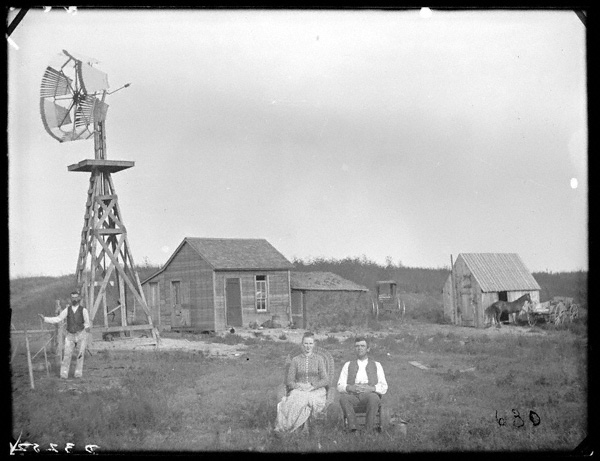Records indicate that Jesse Reeves bought the quarter section of land that today contains Owl Acres. He bought it from the Government for $1.25 per acre. How Jesse and his family fared over the next 15 or 20 years is uncertain, but records do exist of a Jesse Reeves of Elkhorn, Douglas County, Nebraska who fits the general demographic. Assuming that this Jesse Reeves could be our Jesse Reeves, let’s see how things might have been for him and his family.
Jesse was born in May of 1832 in Ashe County, North Carolina. He was the fifth son of Elizabeth Doughton Reeves and her husband whose name I didn’t find. Jesse married a young woman named Elizabeth Barlow. Elizabeth was born in Ohio in 1837. In 1854, when she was 17 and Jesse was 22, they emigrated to the new lands in Iowa.
When Jesse and Elizabeth arrived at their new home, they found 160 acres of open, unbroken prairie near a creek to the east and a river to the southwest. Their first home on the prairie was the wagon they traveled west in. Its canvas cover provided a shelter from the rain and a place to sleep, but most of their living was outside. Elizabeth cooked on an open fire, and washed in water carried from the creek. With no children to manage at first, she also helped Jesse with the back-breaking work of turning the prairie into farmland where they planted their first crops of wheat, corn and potatoes. By mid-summer enough crops were planted to barely get through the coming winter if all went well. Jesse’s next task was to cut down trees in the nearby river valley and prepare the logs to use in building his cabin. Before the snow flew, the Reeves hosted a house-raising party with their neighbors to put up the little twelve-foot-square cabin that would be their home for the next several years.
In time, Elizabeth had a few chickens that she kept close track of during the day and penned in at night. The chickens provided eggs and, on special occasions, meat. If she had some extra eggs or chickens, she could sell them to neighbors for a little cash.
The Reeves bought a milk cow, and while Jesse did the milking, Elizabeth separated the milk, churned the butter, and sold excess cream to a nearby creamery.
Elizabeth did all the cooking, mending, cleaning, and, when children came, she managed all the childcare as well. She also helped her husband with the farming tasks. She planted seeds as he plowed. She helped pick the corn by hand, cutting the ears off with a corn knife. She helped with the threshing by beating the shocks of wheat with a flail to dislodge the wheat kernels. She planted, tended and harvested the potato crop which would provide food all winter. She planted a garden, as well, raising food for the table.
The same year that the Reeves family arrived, the surrounding acreages were purchased and settled by other families. A neighborhood developed and no doubt Elizabeth made friends with the neighbor women. As the years went by, the Reeves family improved their land, plowing more of it, raising more crops and livestock.
A time came when they decided to leave Iowa for new lands in Nebraska. With the sale of their improved acres in Iowa, they could buy more land in Nebraska. So they sold their quarter section to their neighbors the Woodruffs and moved on west. Jesse and Elizabeth had three children including two girls, Ida May and Sephronia, and a son they named William Nebraska Reeves. They located in Douglas County, Nebraska, and brought Jesse’s mother Elizabeth Doughton Reeves to live near them in Omaha. In 1870 Jesse died and was buried in the Brittin Cemetery in Elkhorn, Nebraska. Fifteen years later, Elizabeth remarried, this time to a widower named William Cannon. Widowed again in 1893, she stayed in Elkhorn where she passed away in 1907 at the age of 70.
The story of Jesse and Elizabeth may not be the exact story of the Jesse Reeves who broke the prairie on Owl Acres, but it is typical of the time and the national imperative to subdue the land. A young couple with dreams of land and wealth, strong backs and fortitude, settling in a community of like-minded folk left their indelible mark on the land, changing its face forever from tallgrass prairie to rolling hills of corn, soybean and hay fields.
Photo by: Nebraska State Historical Society
